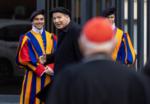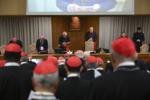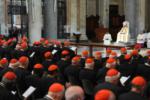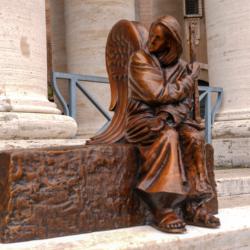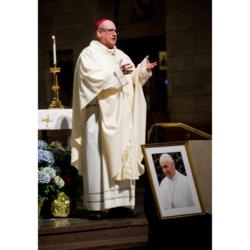Division does not come from God
To camouflage a protest against the Archdiocese of Boston as a eucharistic celebration was, to say the least, thoroughly inappropriate. In the Eucharist we celebrate our unity with Christ and with the Church. It should not become an anti-establishment rally.
Though outwardly calling for unity, Voice of the Faithful is promoting division and encouraging an atmosphere of cynicism against the Church. That is what they did in the height of the clergy abuse crisis when they called on Catholics to withhold contributions from the archdiocese’s annual appeal under the cry, “No donations without representation” — and that is what they are doing now.
Rebels now without a cause, VOTF has become an advocacy group whose mission seems to be simply searching for occasions to discredit the hierarchy of the Church. Their fight is no longer centered on the misdeeds of a particular bishop or around a specific issue. It is about bashing decisions bishops make in their proper role as shepherds.
Unfortunately, it seems VOTF is following a familiar pattern. In Europe, We Are Church was born in the aftermath of sexual scandals in the Austrian Church. Today, they are an extremist group that decries the hierarchy and calls for such things as the full democratization of the Church and the ordination of women to the priesthood. When two years ago VOTF members gathered at the Hynes Convention Center, Thomas Arens, international coordinator of We Are Church was one of the five keynote speakers to address the convention’s general session. At the time we expressed concern that VOTF could find itself moving along the same path as Arens’ organization.
As an advocacy group, VOTF’s continuation depends on their ability to sustain a climate of confrontation with the institution they oppose. In its beginnings, VOTF found that momentum in the clergy abuse scandal. However, as the Church has aggressively responded to the scandal both locally and nationally, that momentum has faded greatly.
Their effort to sustain themselves has led them to broaden their agenda. An opinion piece printed Aug. 14 in The Boston Globe written by VOTF leaders John Hynes and Sheila Connors Grove invokes several issues in addition to those related to the abuse scandal: the role of women in the Church, the “divisive discussion” of same-sex marriage and the reconfiguration process.
All those issues point towards an overall dismissal of their bishop’s leadership and his efforts to rebuild the Church. They go as far as to say that the Church is “dying” and that “those who are charged to save it seem content to let it go rather than making those changes that would require them to be more accountable.” That is a deplorable accusation against their bishop, particularly one who has done so much to heal the wounds resulting from the sexual abuse scandal.
Lumen Gentium has strong words for those who reject their bishop: “The Sacred Council teaches that bishops by divine institution have succeeded to the place of the apostles, as shepherds of the Church, and he who hears them, hears Christ, and he who rejects them, rejects Christ and Him who sent Christ.”





